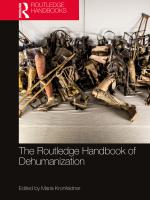The link between hatred, dehumanization, and violence is more complicated than assumed
'A striking feature of atrocities, as seen in genocides, civil wars, or violence against certain racial and ethnic groups, is the attempt to dehumanize — to deny and strip human beings of their humanity. Yet the very nature of dehumanization remains relatively poorly understood'.
The Routledge Handbook of Dehumanization is the first comprehensive and multidisciplinary reference source on the subject and a survey of the key concepts, issues, and debates within dehumanization studies. In their chapter, Associate Professor Thomas Brudholm (University of Copenhagen) and Senior Researcher Johannes Lang (DIIS) analyze the relationship between hatred and dehumanization.
When persons or groups are objects of hatred, they are often perceived to be lesser humans, less than human, or even categorically nonhuman. But the link between hatred and dehumanization is more complicated than one might think.
Brudholm and Lang object to claims that hatred is inherently dehumanizing as well as to arguments which imply that dehumanization and hatred are mutually exclusive. The authors argue against several reductive conceptions of dehumanization: against restricting it to a complete denial of the victim’s humanity, against always seeing dehumanization as a work of negation, against separating dehumanization entirely from moral emotions and motivations, and against limiting dehumanization to psychological processes in the minds of the perpetrators. Brudholm and Lang prefer to think of dehumanization not as one distinct phenomenon, but as a plurality of different phenomena sharing certain family resemblances.
Scholars of hatred, dehumanization, and violence should also take care not to proceed as if all haters are mad, bad, or dangerous dehumanizers. For hatred can, despite its dangerous and dehumanizing potentials, be part of a morally permissible or even virtuous response to dehumanization.
The chapter draws on a diverse and interdisciplinary range of sources, from the psychology of mass violence and the philosophy of emotion to victim testimony and published interviews with perpetrators of genocide. The result is new insights into the relation between hatred and dehumanization in the history of violence.
The virtual book launch is open to the public and takes place on March 23
DIIS Experts


